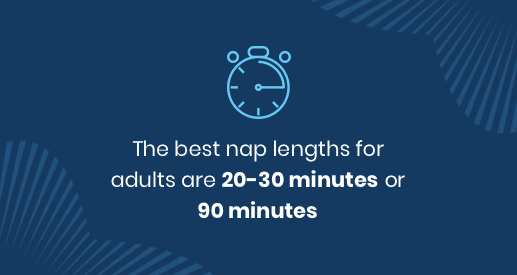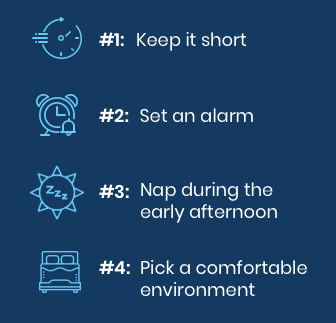How Long Should a Nap Be?

How Long Should I Nap?
There are few things greater than the refreshing feel of waking up from a good nap—but what exactly constitutes a ‘good’ nap? Timing is everything; a nap that is too short or too long can leave you feeling fatigued instead of rejuvenated. A short nap of 10-20 minutes is precisely enough shut-eye to reap the many restorative benefits of napping. 30 minutes could make you feel too groggy once you’re awake. A 90-minute nap is considered best for a longer option.
We’re here to answer all of your questions about catching midday z’s and provide tips on how to make the best of your rest.
- Napping vs. Sleeping: What’s the Difference?
- What is the Best Nap Length for Adults?
- What are the Benefits of Napping?

Napping vs. Sleeping: What’s the Difference?
We’ve all been there—a short and sweet catnap turns into an hours-long snoozefest. Whether you wake up well-rested or even more tired than before, odds are pretty likely that your normal bedtime and a genuinely good night’s sleep are totally out of the window. Therein lies the shining difference between napping and sleeping. Naps are meant to provide a temporary recharge to your battery whereas sleep provides a complete reset.
The most discernible differences between napping and sleeping include duration and sleep cycles. When you fall asleep, your brain naturally moves through four stages of sleep. Each stage progresses sequentially through light sleep, deep s/leep, and REM cycles which repeat on 90-110 minute intervals.
Because the goal of a good nap is to re-energize your mind and body, the best nap length ensures you are not entering REM or deep sleep stages, but only staying in light sleep. So, 10-20 minute naps should be just the ticket!
True sleep, on the other hand, occurs within the deep sleep and REM stages, during which your body undergoes the most impactful restoration. Experts recommend that adults get 7 to 9 hours of sleep every night to maintain a healthy, high-functioning lifestyle.
Best Nap Length for Adults
If you’re like most people, you likely strategize the length of your nap by assessing how much time you have to spare. Rather than leaving the question of “how long should I nap” up to an ambiguous time frame, stick to expert-recommended nap times and ask yourself, what is a good sleep score? for that time frame.

According to the National Sleep Foundation, the best nap lengths for adults are 20 or 90 minutes. Here’s why:
- 10-20 minute naps are also referred to as power naps. These short naps allow you to wake up feeling refreshed, energized, and alert. To sweeten the deal, well-timed power naps have little to no impact on your nighttime slumber, so you can head to sleep at your usual bedtime without any difficulty dozing off.
- 90-minute naps allow you to cycle through all sleep stages while avoiding sleep inertia, since you’re not waking up during deep sleep. These naps can leave you feeling thoroughly rejuvenated, more creative, more focused, and more physically energized.
Benefits of Napping
Sleep experts have found that a little nap time can go a long way for your mind and body. A good midday snooze session can increase alertness, reduce stress, sharpen cognitive skills, improve your mood and help you figure out how to stop being a night owl.
In addition to getting some downtime away from the hustle and bustle of your everyday life, napping allows you to reap a myriad of benefits in 90 minutes or less.

Naps can increase alertness
One of the most significant benefits of napping is that boost of alertness you feel after catching some much-needed z’s. Studies have shown that people who took a mid-afternoon nap woke up with an energy boost similar to one they’d experienced after drinking a caffeinated energy drink or coffee. However, unlike energy derived from caffeine, the rejuvenating power of a nap benefits your whole body, increasing your learning capacity, overall sleep and memory recall.
Naps may reduce stress
Lack of sleep is a prevalent problem that can have a number of negative short-term and long-term effects. And according to the U.S. Centers for Disease Control and Prevention, 1 in 3 American adults are not getting enough regular sleep. One of the most dominant downsides of lack of sleep is stress. Even though the human body is hard-wired to handle stress, constant worry and tension can put you at risk of countless health problems, including anxiety, depression, heart disease, and memory impairment.
By making an effort to squeeze nap time into your busy schedule, you may effectively reduce your stress levels and begin to balance out your sleep troubles. Getting quality sleep can help regulate and reduce the production of cortisol (the stress hormone) and promote faster immune system recovery—leaving you feeling more emotionally stable and ready to tackle the rest of your day.
Naps can sharpen your cognitive skills
Though you may go into a nap feeling groggy and mentally exhausted, you’ll likely wake up feeling sharper and more astute. Napping can boost cognitive flexibility, improve focus, and enhance your brain’s ability to process and store information. In fact, a study conducted at NASA surveyed the cognitive effect of napping on military pilots and astronauts. Those who took a nap improved overall performance by 34% and alertness by 100%. Moral of the story: the better-rested you are, the more intelligently you’re able to function.
Naps may improve mood
In addition to feeling refreshed and ready to tackle the rest of the day, a good nap can elevate your mood. Studies have found that taking a nap can increase frustration tolerance, reduce impulsivity, and boost productivity. With tiredness typically comes irritability, so when you take the time to recharge, you can effectively turn your mood (and day) around.
4 Tips for Napping [Fall Asleep During the Day]
Ready for a nap? Mastering the art of the power nap takes a little bit of know-how and a healthy dose of practice. Follow these four tips to optimize your best nap time.

1. Keep it short
Stick to the two recommended nap lengths: 20 minutes or 90 minutes. If you’re feeling extra tired, it can be difficult to limit your sleep, but it’s imperative to do so should you wish to wake up feeling recharged and refreshed.
2. Set an alarm
Setting an alarm for your naps is a total must if you’re not used to limiting your nap time. This will better ensure that you stay within the recommended nap lengths. Be sure to consider how long it takes you to fall asleep and factor that into your alarm setting.
3. Nap during the early afternoon
Longer naps, especially after 3 p.m., can mess up your nighttime sleep schedule, so it’s more beneficial to you to nap between the hours of 1 p.m. and 3 p.m.
4. Pick a comfortable environment
One of the hardest parts of napping can be falling asleep. If you have trouble dozing off, consider using a weighted blanket or cozying up somewhere cool and comfy that makes it easy to drift off into dreamland. You may also consider practicing mindfulness techniques or applying balms or essential oil blends for sleep.
Of course, try as we might, not everyone can nap. For some of us, it just isn’t in the cards. It’s also worth noting that napping during the day cannot replace our nightly sleep needs. We all need our quality 8 hours each night to get the true restorative benefits of sleep. If napping seems to be getting in the way of you capturing your nightly rest, you should try and remove them from your daily schedule. You can certainly take a nap to make up for a poor night of sleep, but napping after a good night’s rest can actually negatively impact the next night! A good rule of thumb is to only nap when you really feel like you need some extra energy.
Now that you know how long you should nap, what the best nap lengths are, and the many benefits of midday snoozing, all that’s left to do is slip on your sleep mask and doze off. Happy napping!